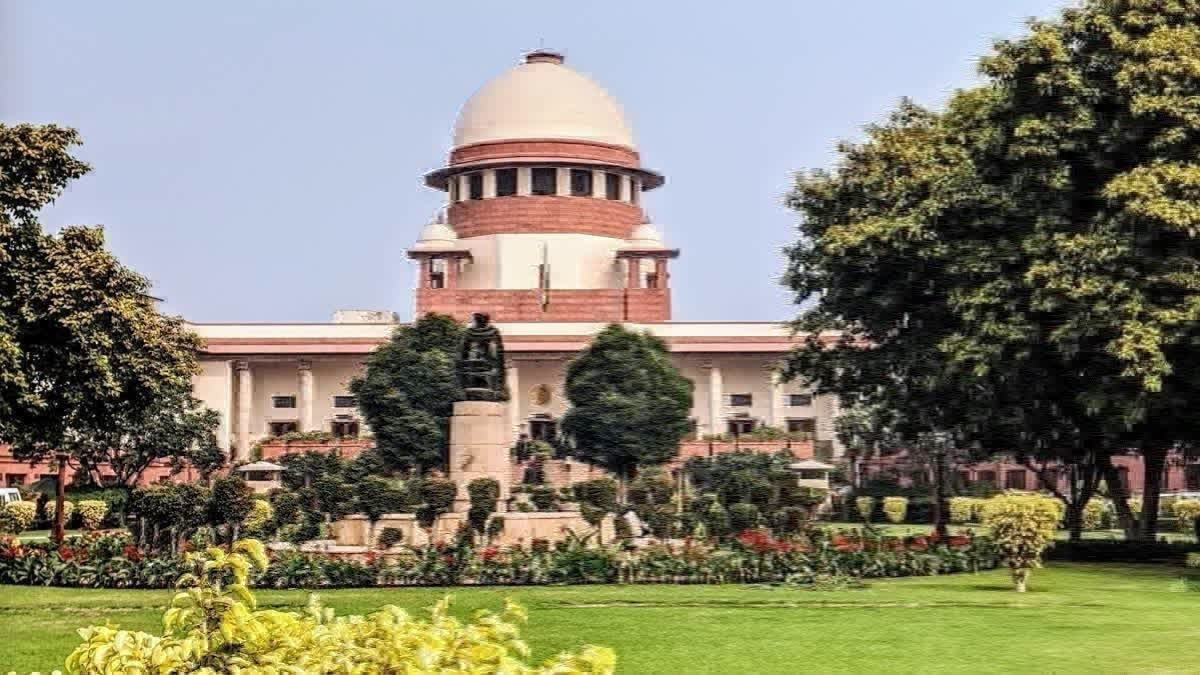New Delhi: The Supreme Court on Thursday queried whether striking down the marital rape exception will create a new offence, and also if it were to strike down the immunity clause in the penal codes then the offence will be covered under the main provision on rape?
Under the exception clause of Section 375 of the IPC, now replaced by the BNS, sexual intercourse or sexual acts by a man with his wife, the wife not being minor, is not rape.
A three-judge bench led by Chief Justice of India D Y Chandrachud and comprising Justices J B Pardiwala and Manoj Misra queried if it were to strike down the immunity clause in the penal codes then the offence will be covered under the main provision on rape?
"Or, can the court create a separate offence or adjudicate the validity of the exception (clause)," asked the bench.
A counsel, representing one of the petitioners, contended that it would not since the offence has already been in the statute and it would not be a new offence. The counsel said Section 377 IPC was still applicable in marital relationships.
The apex court asked those challenging validity of the exception, carved for the husband from the penal provision of rape, to respond to the Centre's submission that making such acts punishable would severely impact the conjugal relationship and cause serious disturbances in the institution of marriage. The counsel vehemently argued that this was not a case between men versus women but a people versus patriarchy case.
The apex court was hearing a batch of petitions seeking the criminalisation of marital rape. During the hearing, the apex court said it will decide the constitutional validity of penal provisions in the Indian Penal Code (IPC) and the Bharatiya Nyaya Sanhita (BNS) which grant immunity from prosecution to a husband for the offence of rape if he forces his wife, who is not a minor, to have sex with him.
The bench, considering the repercussions of criminalising marital rape, asked a counsel regarding a situation where a wife files an FIR against her husband. The bench queried, if a husband demands and if the wife declines, she believes that the husband should not have done it, and the next day she goes and lodges FIR that this is what happened, then how do you perceive, while seeking counsel’s assistance.
Referring to the fundamental right of freedom of speech and expression under Article 19(1)(a), the counsel emphasised that the presence of the exception hinders a wife's right to express consent for sexual acts in a marriage.
Senior advocates Karuna Nundy and Colin Gonsalves, appearing for some of the petitioners, argued before the bench that the harm caused to a woman being raped by the husband or a stranger is not different.
The counsel asked, in a case of live-in relationship, sex without consent is treated as rape then why not in marital relation?
Citing the right to privacy in the K S Puttaswamy case, the counsel pointed out that it has been held that privacy can't be used to inflict gender-based violence or abuse the rights of women.
Nundy contended that according to The Hale's principle, which was prevalent in England, a husband cannot be held guilty for raping his wife. At this juncture, the CJI replied that the central government, in its counter affidavit, has given up the Hale’s principle."
The bench said that they have said that they don't subscribe to the view that entering upon a wedlock is an absolute consent for a woman to be subjected to intercourse by a husband.
"Therefore, they accept the fact that consent is necessary. So now they have given go by to The Hale’s principle. But having done that, they said there are other provisions such as domestic violence act, cruelty as a ground for divorce, so on and so forth," said the CJI.
On October 3, the Centre in an affidavit in the Supreme Court, opposing the petitions seeking the criminalisation of marital rape, said that in matters falling squarely within the domain of the regulation of marital relationship between spouses, a societal issue, due deference be exercised while testing the validity of legislative choice made by the Parliament. Marital rape is excluded from the ambit of "rape" by way of Exception 2 to Section 375 of the Indian Penal Code.
The Union Home Ministry said given the nature of the marital institution in our socio-legal milieu, if the legislature is of the view that, for the preservation of the marital institution, the impugned exception should be retained, it is submitted that it would not be appropriate for the apex court to strike down the exception.
The affidavit said the Centre is committed to fully and meaningfully protecting the liberty, dignity and rights of every woman who are the fundamental foundation and a pillar of a civilised society. The government said it attaches the highest importance to ending all kinds of violence and offences causing physical, sexual, verbal, emotional and economic abuse including domestic violence against women.



